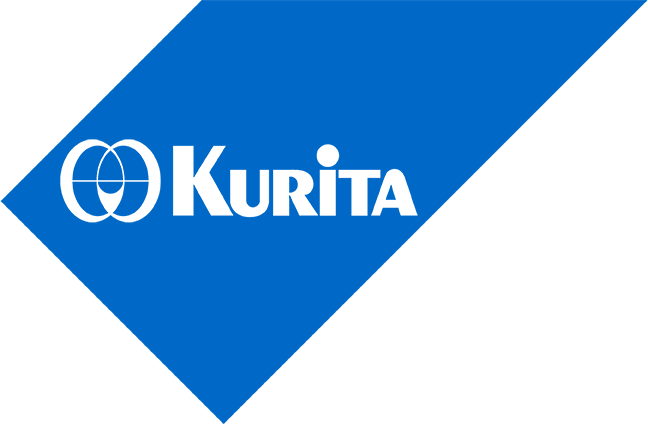An adhesives manufacturer, a Kurita customer of over 10 years, utilizes three water tube boilers for its steam supply and produces 85,000 pounds an hour of steam. The make-up water for steam generation is prepared using a reverse osmosis (RO) system followed by sodium zeolite softening. Since the city’s makeup water can contain calcium levels that are hundred times higher than what is accepted for boilers, both pre-treatment options are necessary. After a chlorine shock from the city water supply, the RO final rinse and softener failed, and as a result, hardness was introduced into the boiler systems. Also, free chlorine passed from the RO to the softener, which damaged the already aging softener resin.
Traditional scale inhibition programs failed under the harsh conditions. While the water only contained two parts per million (ppm) of hardness, at sixty cycles of concentration, the amount would be 120ppm in the boilers. A water softener removes calcium, magnesium, iron, and many other cations, but because of the chlorine shock, the current water softener no longer worked. During initial and daily softener testing by Kurita, the inorganic calcium carbonate scale formation of more than 1/64 of an inch thick on the boilers heat transfer surfaces were observed during a boiler inspection.
Due to the insulating effect of the scale, natural gas usage increased noticeably. While CO2 emissions did not exceed allowable limits per the customers permit, more CO2 emissions were released due to higher fuel consumption. Superseding the permit could’ve cost the company further.
 Based on the manufacturer’s objectives and the current issues facing the RO systems and boilers, the manufacturing company applied Kurita’s engineering and equipment expertise to correct the RO system and softener failures. The scale was calcium carbonate in nature, and field testing using 1:1 hydrochloric acid (HCl) confirmed carbonate and then dissolved deposit tested positive for calcium. The objectives were to remove scale during normal operation (online cleaning) while preventing any further deposition and avoid any risk of corrosion to improve boiler efficiency.
Based on the manufacturer’s objectives and the current issues facing the RO systems and boilers, the manufacturing company applied Kurita’s engineering and equipment expertise to correct the RO system and softener failures. The scale was calcium carbonate in nature, and field testing using 1:1 hydrochloric acid (HCl) confirmed carbonate and then dissolved deposit tested positive for calcium. The objectives were to remove scale during normal operation (online cleaning) while preventing any further deposition and avoid any risk of corrosion to improve boiler efficiency.Kurita worked with the customer to help choose the best solution for the issues, and they chose Kurita’s DReeM Polymer™ technology, an award-winning polymer technology that removes silicate and hardness scale from boiler water side surfaces up to four times more efficiently than conventional polymers. DReeM Polymer is fed at a regular rate based on the boiler system cycles with no extra dosing needed and allowed for expedited removal and future prevention of scale during normal operation of the boiler.
The boiler water treatment was changed to a treatment approach based on DReeM Polymer technology, and Kurita dosed the boilers with a concentration of seven ppm in the feedwater. The key performance indicators (KPIs)—visual scale removal and decreased natural gas consumption—were evaluated over twelve months to demonstrate the treatment success and system improvements.
The city water flows through the RO systems, and the RO permeate is polished by the softeners and then used as make-up to the boilers. The city water that was highly chlorinated shocked the system for three to four months, and as a result, the RO membranes were damaged and the aged softener resin could not keep up with the removal of the added hardness. The RO membranes were eventually changed, but getting the softener new resin was the first priority. Kurita worked to choose the appropriate resin that allowed the site to increase run time and reduce water and salt consumption. The new resin efficiently and effectively removed the hardness to prevent it from entering the boilers, and the DReeM Polymer removed the deposits.

After a year of applying DReeM Polymer, all scale deposits were virtually removed, and daily polymer and hardness testing confirmed the improved results. By returning to normal operating conditions, the plant saved $46,000 annually in energy costs. With the boiler surfaces clean, improved heat transfer was achieved, and the site reduced natural gas usage by 10,320,000,000 British thermal units (BTU) per year and 652 metric tons of CO2 reduced too.
Kurita’s DReeM Polymer Technology solved the technical problems regarding scale formation on heat transfer surfaces in the steam generation system without the need for an expensive downtime and an off-line descaling. Now, the customer can operate the steam generation system with maximized efficiency and minimized energy consumption and carbon footprint.
About the Authors:

 Sarah Christians is a graduate from Winona State University, where she obtained her bachelor’s degree in Geology. From outdoor hydrogeology to industrial water applications, she has worked in the field with Kurita America for nearly five years as a sales representative, overseeing equipment in the food & beverage, healthcare, and different manufacturing industries.
Sarah Christians is a graduate from Winona State University, where she obtained her bachelor’s degree in Geology. From outdoor hydrogeology to industrial water applications, she has worked in the field with Kurita America for nearly five years as a sales representative, overseeing equipment in the food & beverage, healthcare, and different manufacturing industries.
Darin Wrazidlo is Kurita America's manager of CSV technologies and has nearly 20 years of industrial water treatment experience. He works with many sectors, including biofuels, power generation, food and beverage, and healthcare and institutional applications. Darin has a bachelor’s degree from the University of Minnesota.

